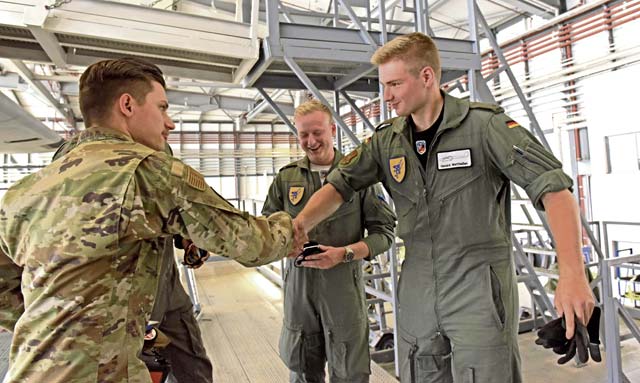
“Before you fly the aircraft, you need to know how to it operates,” said German air force Col. Hans Rudolf, commander of the German air force liaison office to U.S. Air Forces in Europe.
For the last two weeks German air force academy cadets, who will become pilots upon graduation, have trained with the 86th Maintenance Squadron to gain skill on caring for an aircraft before takeoff and after landing.
This is the first time the German air force, or Luftwaffe, has implemented this internship.
“The idea is that young pilots gain an understanding of flight safety while having close contact with a maintenance crew,” Col. Rudolf said. “The big advantage is that they now have a technical idea of the aircraft, which is a huge contribution to flight safety.”
The training offers cadets an opportunity to perform various technical work such as changing tires, hydraulic hoses, and exchanging lubricants. The course aims to strengthen the understanding between the pilot and technology.
“Generally, we know what to expect when learning about aircraft maintenance,” said 1st Lt. Marc Rudolf, German air force academy cadet, whose father coordinated the internship. “What I really appreciate is the friendly contact between German and U.S. Airmen. We do flight training together, but not maintenance. This is our opportunity to learn how maintenance progresses and when I fly a plane I have experience with how the maintenance process works.”
Though this is an internship for the cadets, 86th MXS Airmen also benefit from their presence.
“It is great to see our maintainers integrating with future German pilots and building camaraderie,” said Senior Master Sgt. Dominik Gutierrez, 86th MXS aerospace ground equipment flight chief. “We are excited as maintainers to educate cadets on maintenance, and the cadets are eager to learn and love the aircraft — and it shows.”
This program is usually held at a German air force base and exclusively on German aircraft. The implementation of the internship expands their understanding of American aircraft prior to attending flight training at Shepard Air Force Base, Texas.
“The cadets now have a comparison between the German and U.S. Air Force aircraft maintainers,” Col. Rudolf said. “They have an increased understanding of the cultural and human approach the U.S. takes when they get to Shepard Air Force Base for training.”
With the first installment of the internship complete, all agree this is a program that compliments mutual goals.
“The United States is a very important military partner and we are grateful we are marching together and have the same vision to protect cultural freedom,” said Col. Rudolf. “This is a super program for them and it represents the interoperability and partnership our nations have built together.”
Though this may have been the first time the internship has occurred at Ramstein, the goal is that it will not be the last.
“This program was also a complete success,” said Chief Master Sgt. Nico Weimer, command chief of the German air force air liaison office to USAFE. “We have experienced great cooperation between the cadets and the U.S. Air Force. There was a lot of understanding created, and both sides have learned a lot from each other.”


